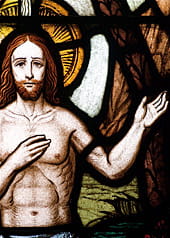Act II: The Luminous Mysteries
- Part I. The Baptism of Jesus
- Part 2. The Wedding in Cana
- Part 3. Proclamation of The Kingdom of God
- Part 4. The Transfiguration of Jesus
- Part 5. The Institution of The Eucharist
Introductory Sequence

The Luminous Mysteries begin with an angelic chorus of praise. God promises that the seed of Abraham, The Desired Of All Nations, Jesus, will come and establish a new house of The Lord that will be better than the former house. He will bless this house with peace. He warns the pastors that His sheep have not been protected: therefore, He will send His Son, The King, who will be wise and execute justice.
Jesus proclaims that He will gather up those who have been scattered, heal them, and strengthen them. The Holy Spirit says the people will speak of the glory of Jesus’s Kingdom and that a new covenant will be made full of signs that have never been seen before.
Part 1. The Baptism of Jesus
Jesus and His cousin, John the Baptist, are now young men of about thirty years of age. John the Baptist is renowned as a powerful prophet. He announces the arrival of The Lord Jesus—The Lamb of God, The Ruler of the Earth—and calls the people to conversion.
God deems Jesus to be a priest forever and vows to uphold Him by bestowing His Spirit upon Him. Jesus agrees to being employed by God for His purposes. Satan sarcastically questions The Lord by asking, Lord, who shall dwell in thy tabernacle? (Ps 14:1), for he has gone about the earth and has found that everyman is for his own self, refusing to acknowledge God or do penance.
God instructs Jesus to turn toward Israel and prophesy against the corrupt prophets and priests who have led His people astray. Mary tells Jesus that when He comes into the service of God, He will need to prepare Himself for temptation and that He should fight for justice even unto death. In preparation for the commencement of His ministry, Jesus fasts and prays for forty days and forty nights.
Satan and his angels tempt the people to indulge in the pleasures of the earth: they need not be concerned about oppressing the poor, the aged, and the feeble, for they are privileged to live in peace and no evil will come to them—there are no consequences for disobeying God’s laws. Satan justifies his philosophy by arguing that they are entitled to enjoy their many pleasures, because earthly life is short. He then tempts Jesus, and Jesus sharply rebukes him for causing confusion and leading His people astray. Jesus, the Archangel Michael, and God’s angelic chorus engage Satan and his rebellious angels. Jesus commands that they follow The Way of The Lord, but Satan and his minions refuse, and Jesus and His angels banish them.
The New Testament Scripture follows with the prophet John the Baptist baptizing Jesus, in fulfillment of Scripture. At Jesus’s baptism, the Holy Spirit descends in the form of a dove and comes upon Him. God’s voice is heard claiming Jesus as His Son. John the Baptist sees Jesus again and calls Him The Lamb of God. In preparation for the commencement of His public ministry, Jesus goes into the desert for forty days and forty nights to fast and pray. There, Satan challenges Jesus’s power and tempts Him, but Jesus rebukes Satan with authority, and Satan departs.
Part 2. The Wedding in Cana
God again announces that new things will come upon the earth, which He will multiply throughout the world. Jesus proclaims that these new things will replace the old things, which will be remembered no more, and that those peoples who are faithful to God will experience abundance.
Mary, Jesus, and His disciples are invited to a wedding feast in Cana, where the chief wine steward says that the wine has run out and they have nothing to drink. Steadfast in faith, Mary petitions Jesus to help them. Jesus instructs the people to do as He commands them to do and gives drink to His chosen people—plenty of the finest wine. Mary claims Jesus as her Redeemer and is joined by the chief wine steward, and the bride and bridegroom, who all sing praises to Jesus.
In the New Testament Scripture, Mary asks Jesus for His assistance when the wine runs out. Although Jesus remarks that His time has not yet come, Mary tells the waiters to do everything her Son commands them to do. Not refusing His Mother’s request, Jesus instructs the waiters to fill six stone water pots with water that He then turns into fine wine—His first miracle. The chief wine steward, tasting the new wine, asks the Bridegroom why he has saved the best wine for last. As a result of the miracle, Jesus’s disciples begin to believe more strongly in Him.
Part 3. The Proclamation of The Kingdom of God
The Holy Spirit implores God to set a Lawgiver over the people to teach them humility. God commands Jesus to take His disciples and teach the people about His Holy Way. Now beginning His public ministry, Jesus speaks of His mission to bring forth The Law of God: for all hope, life, and virtue are found in His truth and grace, but death will come to those who forsake Him. Jesus has come to preach to the meek, release the captives, deliver those who are shut up, and convert the people to The Way of God.
Hearing His words, the men and women of Jerusalem clamor for Jesus to heal and forgive them. Jesus further expounds on God’s merciful forgiveness and how they must be merciful to their enemies. The pharisees object to Jesus teaching the people to be merciful to sinners, as they teach to avoid sinners, but Jesus rebukes them by pointing out their own failings. A pharisee objects that His teachings are not equitable and questions why Jesus reviles them. Jesus retorts that no one is guaranteed salvation: the same day a just soul sins, the same day it shall die; and the day a wicked soul converts, his former wickedness will not hurt him.
One pharisee repents and Jesus instructs him to be as merciful to His Father’s House as He has been merciful to him. The four evangelists and God’s angelic chorus reaffirm Jesus’s teachings of law and peace. Satan, the pharisees, and the rebellious angels escalate their battle: they will not follow the path of mercy and goodness, even though Jesus and the apostles plead with them to change their ways.
In the New Testament Scripture, Jesus proclaims that He has not come to destroy God’s Law, but to fulfill it even more perfectly and redeem sinners. He begins His ministry by telling the people that they should do penance and let their light shine before men. He also tells them to forgive and love their enemies and that their justice should be greater than that of the scribes and pharisees.
The pharisees observe Jesus sitting with sinners and question Him. Jesus replies that He has come to heal the sick and sinners and not those who are already healthy and just. He instructs them to learn what it means to have mercy and not sacrifice.
Part 4. The Transfiguration of Jesus
Jesus brings His disciples Peter, John, and James up a holy mountain where God, in the form of a pillar of a cloud, and the prophets Elias and Moses are made visible. The apostles witness, as Jesus is transfigured and presented to God. Jesus declares His zealousness for Th e Lord, but says that The Children of Israel have forsaken God’s covenant and now they seek to kill Him.
God proclaims that He will use Jesus to take away the people’s iniquity in one day and then foretells of Jesus’s sacrificial death for their atonement. The prophet Elias laments at the suffering that Jesus’s Mother, the widow Mary, will experience at Jesus’s death. The prophet Moses tells Jesus not to fear the people, because God will be with Him and the nations will eventually be delivered into His hands. God tells Jesus to be at peace: He will protect Him and He will be greatly rewarded.
The prophet Moses affirms that God has now sanctified His Tabernacle, Jesus, and further details Jesus’s coming crucifixion. God then foretells that it is through Jesus’s death and Resurrection that His judgment will come. Jesus will establish His House, the Church, through which the apostles and their successors will teach and baptize all humankind, until His Kingdom is established forever. The prophet Elias rejoices at learning that Jesus will be victorious and that eventually all kings will obey His Law. Now sanctified for His mission, Jesus proclaims that His people will be redeemed by Him and live confidently in peace. Satan and his rebellious angels are infuriated and promise terrible tribulations for Jesus. Mary and God’s angels urge Jesus to proceed onward in truth and righteousness.
In the New Testament Scripture, Jesus leads Peter, James, and John to a holy mountain, where He is transfigured before them. The apostle Peter, marveling at the sight, suggests that three tabernacles be made: one for Moses, one for Elias, and one for Jesus. The voice of God is heard naming Jesus as His Son. Jesus tells His disciples not to tell anyone of what they have heard until He is Risen from the dead, but His disciples do not understand the meaning of His words. Afterward, the apostles question Jesus about the pharisees and scribes who say that Elias must come first. Jesus replies, Elias, when he shall come first, shall restore all things; and as it is written of the Son of man, that he must suffer many things and be despised (Mk 9:11). Upon Jesus’s coming down from the mountain, the multitude of people, seeing Him, is struck with fear.
Part 5. The Institution of The Eucharist
It is again the time of the Pasch. After preparing for three years, Jesus will now offer Himself as the sacrificial lamb for the paschal holocaust, in atonement for the iniquity of all the children of God. God tells the Daughter of Jerusalem that The Saviour will come to her, poor and riding upon an ass, and upon a colt, the foal of an ass (Za 9:9). The Holy Spirit solemnly testifies that God has now prepared his victim and sanctified his guests (Soph 1:7). Jesus proclaims that He will go to the altar of God to offer His sacrifice.
The apostle Judas is disturbed at the turn of events and grumbles that Jesus’s Ways are so different from those of others that he has become a fear to his acquaintances. At the Passover supper, Jesus gives His disciples His Flesh and Blood, in the form of bread and wine, to make atonement for their souls. The apostle Judas is decidedly scandalized by Jesus’s sacrificial rite and His claim that He is The Son of God. He chooses to turn against Jesus and join Satan and the temple leaders who are scheming to kill Him.
The apostle Peter is also fearful at being considered an outcast, but Jesus urges him not to fear. Jesus is confident that He is fulfi lling God’s mission, but He laments that a friend has betrayed Him.
The New Testament Scripture begins at the eve of the Pasch, as Jesus sends His disciples ahead to prepare the Passover meal. At supper, He consecrates the bread and wine as His Body and Blood and foretells His coming betrayal, death, and Resurrection. He also tells His disciples that one of them, who is eating with Him, will betray Him. All of them ask Him, Is it I? (Mk 14:19). When Judas asks Him that same question, Jesus responds, Thou has said it (Mt 26:25). The apostle Peter earnestly reassures Him that he will not deny Him, as do all the other apostles. But Jesus, who knows all things, tells Peter exactly how he will deny Him that very night.
The Sorrowful Mysteries:
The Agony in the Garden
Aria – Mary
O Earth, Earth, Earth,
hear the Word of the Lord.
(Jer 22:29)



